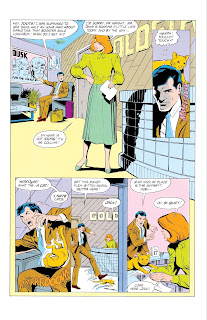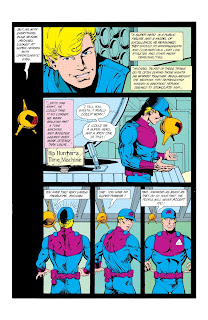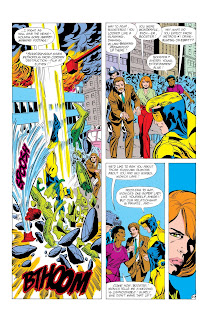Last time around, I talked about how I’m not feeling particularly interested in reading contemporary superhero comic at the moment. My focus seems to be more on reading new creator-owned or creator-driven comics, rather than corporate-owned ones (with some exceptions; Star Wars, Doctor Who, Conan, and Immortal Hulk, I am looking at you). So, ironically, this week, I am going to talk about a character who has become one of the most mainstream of mainstream superhero characters. But he arguably wasn’t always that way, and that’s what I was reminded of when I recently read a collection of the first 12 issues of Booster Gold, written and drawn by his creator, Dan Jurgens. That, and how much I enjoyed these comics when they were first released.
DC Comics published Booster Gold #1 in early 1986. At the time, I was a huge DC Comics fan. Thanks to creators and comics like Marv Wolfman and George Perez on The New Teen Titans, Paul Levitz & Keith Giffen on Legion of Super-Heroes, and Mike W. Barr & Jim Aparo on Batman and the Outsiders, I had become totally drawn in to the DC universe and its extensive continuity. That had been cemented by reading Crisis on Infinite Earths (arguably the first big “event” comic) and Who’s Who: The Definitive Guide to the DC Universe.
I lump that whole period of the mid-80s from DC as a time that felt particularly creative, at least to my adolescent mind. There were all the regular superhero comics, but we also got books like Amethyst, Princess of Gemworld and ‘Mazing Man and Blue Devil and so many others. And I was too new to comics to really realize that most of these comics would probably only last a couple of years. (Then, as now, the market was dominated by superheroes.) Even though Booster Gold is much more squarely a mainstream superhero than those other books, I suppose, I still think of it as part of that wave.
And Dan Jurgens was hardly the established creator that he is today. Now, he is known as a longtime writer and artist on Superman, as well as working on books like Captain America, Thor, and so many others. At the time, I knew him as the pretty good artist who had taken over from Mike Grell on Warlord, and the pretty good artist on Sun Devils who ended up writing the last couple of issues (which I never actually read, for whatever reason).
(Oh, you can add Sun Devils, and Blackhawk by Mark Evanier and Dan Spiegle, and Atari Force, and Saga of the Swamp Thing by Alan Moore, Steve Bissette, John Tottleben & Rick Veitch, and Camelot 3000 by Mike W. Barr & Brian Bolland, and probably The Shadow to that list of unique, creative comics from DC during that period. Probably Watchmen by Moore & Dave Gibbons, too.)
So I bought the first issue of Booster Gold, because I was curious to see how Jurgens, who I knew primarily as an artist I liked, would handle creating and writing a superhero comic. And… I don’t really remember what my reaction was. I think I liked it, certainly liking it enough to read it for a while, if not for its entire first run. But this would have been around the time I left home to go to college, and didn’t have the money to buy as many comics as I used to, or the space to store them. So it may not have made the cut once I moved.
 |
| I love that Booster's office has cats |
Over the years, though, I enjoyed Booster Gold’s appearances in places like Justice League by Keith Giffen, J.M. DeMatteis, and Kevin Maguire and others. Years later, when he got his own comic again, drawn (but not written, at least not at first) by Jurgens, I started reading it, and liked it. I liked it even more when Jurgens took over the writing again. And then he left, and I didn’t enjoy it quite so much, so I stopped reading it.
Recently, DC Comics published a nice color hardcover collection of the first 12 issues. When I saw that, it reminded me of all the fond feelings I had reading the original issues, along with all those other great comics, when I was in high school. So I bought it, and I read it, and I really enjoyed it. It’s possible, at the time, I didn’t appreciate it as much because it was, in so many ways, a straightforward superhero book in a comics landscape full of things like Watchmen and what have you, and I thought those pointed the way to the future of comics in a way that something like Booster Gold did not.
Of course, that didn’t turn out to be the case. Now, decades later, I can appreciate Booster Gold on its own merits. And it has a lot of those. The art, certainly, is excellent. Like most artists, Jurgens would continue to improve as his career went on, but even at this earlier stage, he has interesting but easy to follow layouts and clear storytelling, his characters look like distinct individuals, and he creates interesting designs for his heroes and villains. In short, his work looks both visually interesting without sacrificing clarity.
As a superhero creation, the idea of Booster Gold as a superhero who uses his celebrity to make money through endorsements and similar deals has a bit more nuance in these early issues by Jurgens than he does in the hands of other creators. The Booster we see here is a genuine hero. He does not manufacture scenarios in order to promote himself as a hero, and he doesn’t hold back from being a hero for selfish reasons. For all intents and purposes, he is as much a straightforward superhero as Superman, or the Flash, or any other DC superhero of the time.
 |
| You gotta love a comic who picks Rose and the Thorn as their first big guest star |
Only he isn’t. Because he does sign endorsement deals and use his celebrity as a hero. And that’s not what heroes do. Not heroes in comics, anyway; show me a celebrity in today’s world who doesn’t do what Booster Gold does, and I will be pleasantly surprised. I feel like later creators—even Giffen & DeMatteis in Justice League, much as I loved those comics at the time—treated Booster as kind of a hapless putz, who tries to be a hero more than he succeeds. He and Blue Beetle (another straightforward superhero in his own comic) were turned into a pair of lovable goofballs in the pages of Justice League, and that’s what stuck. But, as good as those comics are, and as much fun as they were to read at the time, I don’t believe that’s the Booster we see here.
I don’t want to oversell the moral ambiguity and sophistication in these pages—nobody is going to mistake Booster Gold for, say, Watchmen—but as I think about it, I am trying to articulate what, exactly, is wrong with Booster’s actions. He isn’t profiting off anyone’s pain or suffering. He isn’t exploiting anyone for his own financial gain. He isn’t manufacturing situations for his own profit—or at all—nor is he refusing to help even if there’s nothing in it for him. Unlike firefighters or police officers, he isn’t paid for his work as a hero.
 |
| Jurgens depicts emotion so well without words |
And yet, something feels wrong about what he is doing. And I have to ask myself: is there genuinely something inappropriate about Booster’s actions here? Or am I just judging him by the standards set by fictional heroes in fictional stories in a fictional superhero universe, rather than by the standards of the real world?
Because of the sort of character Booster is, and the superhero comics landscape of 1986, Jurgens—perhaps necessarily—introduces a couple of innovations that set the comic apart from its contemporaries, For starters, Jurgens makes the decision to hold off on telling Booster’s origin for the first six issues. This was unusual for the time, but makes sense in hindsight. Booster’s real identity, Michael Jon Carter, is ultimately revealed to be a gambler and a thief, who stole future technology and traveled back in time to become a superhero. If the reader had known this from the start, it might have automatically colored their opinion of Booster as a hero. Instead, by keeping that information from the reader, we can learn about who Booster Gold is as a hero in the 20th century, before learning who he was in the 25th.
A side effect of this decision, though, is that we don’t really get to know Booster Gold as anyone other than Booster Gold. We don’t get the common-for-the-era scenes of the hero in their secret identity interacting with folks in the workplace or school or in everyday life. I feel like a focus on the heroic over the human is pretty common now, but back in the mid-80s, even Batman got to spend lengthy amounts of time as Bruce Wayne forming actual human relationships with actual humans who weren’t costumed heroes. We do get to know Booster’s assistant, Trixie, somewhat, and his manager, Dirk, a little less, but because Jurgens can’t rely on the familiar secret identity tropes to create quiet character moments, he has to tell the story slightly differently than was common at the time.
Aside from those twists, though, I feel like Booster Gold tells some fairly solid superhero-vs-supervillain stories, full of action and suspense. Maybe even a little more suspense, because for the first half of that first year, we don’t really know much about Booster besides what’s presented on the page. We can’t take anything for granted, because we don’t know all that much.
Arguably, that style of superhero comic isn’t something that we see any more, but I firmly believe that the events of September 11, 2001, changed superhero comics forever. The notion of Captain America trying to stop Hydra from blowing up a skyscraper in New York City no longer works as a larger than life adventure when that exact thing has happened in the real world. I feel like, post 9/11, the notion of a super-criminal trying to rob a bank or take over a city became small-potatoes when compared to events in the real world, and comics had to increase their stakes proportionately.
I wonder if maybe that’s why I’m currently not feeling excited by the Marvel and DC superhero comics I used to love, as I mentioned in my previous post. I mean, back in the 90s, DC did a storyline about corrupt businessman Lex Luthor managing to get himself elected president of the United States, and abusing that power to benefit himself. And ultimately, Superman stopped him. Obviously, this no longer feels like escapist entertainment, and maybe I’m feeling like the sort of superheroic escapist stories that Marvel and DC are telling aren’t really what I’m needing right now.
The Booster Gold collection only collects the first 12 issues, and ends on a bit of a cliffhanger. I’ve been continuing reading the series on DC Universe, and it continues to entertain me. When I’m done, I’ll probably skip ahead to the 52 series, which I’ve never read, and from there go onto Booster’s next solo series. I did read that for a while, until Jurgens left, and it stopped feeling so much like Booster Gold to me. Maybe I’ll give those stories another shot, or maybe I’ll just stick to the Jurgens material.
 |
| An early house ad for Booster Gold |
Regardless, it’s nice to see I can still enjoy at least some of my childhood favorites. Dan Jurgens is still actively producing comics; I believe he’s writing Batman Beyond for DC right now. Maybe I’ll give that a look; I really wish he’d do something creator-owned at this point, because I really want to see something that’s purely him. Although I suppose Booster Gold may be as close to that as I’m likely to get. That’s fine; the issues hold up to rereading, obviously. I just always want more.
 |
| I had one of these buttons; I received it when I bought the first issue, I think. |
That’s about it for this week. I think I’ll skip the 2000 AD highlight, because it’s pretty much the same as last week. See you in 2 weeks!






















No comments:
Post a Comment